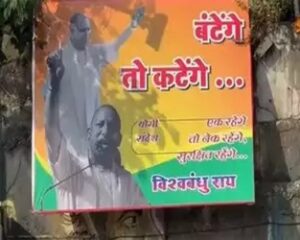On October 24, 2024, Citizens for Justice and Peace (CJP) filed a complaint with the Maharashtra State Election Commission, raising grave concerns about the violation of election laws through the use of divisive communal messaging in posters displayed across Mumbai. These posters prominently feature Uttar Pradesh Chief Minister Yogi Adityanath, alongside the slogan “बटेंगे तो कटेंगे” (“Batenge to katenge”), which translates to “If divided, we will be cut,” and are alleged to foster communal tensions as Maharashtra heads toward its Assembly elections on November 20, 2024.

CJP’s complaint highlights the inflammatory nature of this messaging, arguing that it is part of a broader attempt to appeal to communal sentiments and polarise the electorate. The posters bear the name of Vishwabandhu Rai, a BJP leader, indicating his involvement in their dissemination. The complaint stresses that these posters mirror remarks made by Chief Minister Adityanath in August 2024 in Agra, where he referred to the political situation in Bangladesh, cautioning against divisions within India and hinting at violent consequences if such divisions occur. The posters leverage these remarks to stoke fear among voters by implicitly linking communal harmony with political outcomes.
Specific concerns raised by CJP
- Use of communal and fear-based messaging: The core message, “If divided, we will be cut,” positions the upcoming elections within a broader communal and national security framework. By warning of potential violence if certain communities do not “stay united” in line with a particular political vision, CJP argues that the posters are intended to play upon communal divisions, particularly affecting Muslim and minority communities. The complaint also notes that the use of saffron, yellow, and green as the dominant colours in the posters is a calculated move to invoke specific religious sentiments.
- Context of CM Yogi Adityanath’s speech in Agra: CJP highlights that the poster’s messaging is drawn directly from CM Yogi Adityanath’s speech, where he raised concerns about the mistakes made in Bangladesh and suggested that a similar fate awaits India if communities remain divided. By utilising such remarks in the context of a highly polarised election environment, CJP argues that the BJP is indirectly fostering fear and sowing the seeds of communal discord.
- Impact on Maharashtra’s communal fabric: Maharashtra is known for its political and religious diversity, and Mumbai, in particular, has historically been a flashpoint for communal tensions. CJP warns that such posters can heighten these tensions, especially in a politically charged environment. By invoking fear of communal strife, these messages aim to deepen the polarisation of voters along religious lines, potentially leading to unrest and violence in the state.
Violations cited in the complaint
CJP’s complaint argues that these posters violate multiple provisions of the Representation of People Act, 1951, as well as the Model Code of Conduct (MCC), which came into effect following the announcement of the election schedule.
- Violation of Section 123(2) and 123(3) of the Representation of People Act, 1951: Section 123(2) prohibits undue influence in elections, including direct or indirect attempts to interfere with voters’ free exercise of their electoral rights. CJP alleges that the posters are designed to instil fear and promote hatred between different classes of citizens based on religious lines, particularly targeting minorities.
Section 123(3) prohibits electoral appeals based on religion, race, caste, or community. By invoking religious sentiments and playing upon fears of division, the posters, according to CJP, are clearly designed to influence voters by stoking communal tensions, which breaches this provision.
- Violation of the Model Code of Conduct (MCC): CJP contends that the posters also breach the Model Code of Conduct (MCC), which is enforced by the Election Commission of India during election periods to regulate the behaviour of political parties and candidates. The MCC clearly states that no party or candidate should indulge in any activity that aggravates existing differences or creates mutual hatred between communities. It further prohibits the use of inflammatory language, symbols, or slogans that can fuel communal or caste-based divisions.
The complaint comes at a time when the political atmosphere in Maharashtra is already tense. With the Assembly elections approaching, political parties are vying to consolidate their voter bases, and the appearance of these posters could exacerbate existing communal divides. CJP warns that if left unchecked, these posters could contribute to communal violence, disrupt public order, and undermine the integrity of the electoral process.
CJP underscores the importance of maintaining electoral integrity and the secular character of the election process, particularly in a diverse state like Maharashtra. The organisation warns that such attempts to polarise voters along communal lines are likely to result in significant unrest, potentially derailing the entire election process.
CJP’s call for decisive action aims to prevent the use of communal fear-mongering as a political tool and to preserve the integrity of Maharashtra’s democratic process. Through the complaint, CJP made several key demands: the immediate removal of all posters featuring the communal slogan “बटेंगे तो कटेंगे” from public spaces across Maharashtra; a thorough investigation into BJP leader Vishwabandhu Rai’s involvement in the poster campaign, with legal action if he is found in violation of election laws; strict enforcement of the MCC to prevent political parties from using divisive or communal rhetoric; and a public clarification from the BJP leadership disassociating itself from the inflammatory messaging of the posters.
The complete complaint may be read here.
Related:
The curious case of Mumbai Mahanagari’s 36 seats: who holds the winning card?
Suresh Chavhanke: The voice of extremism and champion of division media

